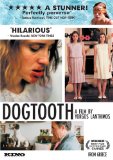| Reviews & Columns |
|
Reviews DVD TV on DVD Blu-ray 4K UHD International DVDs In Theaters Reviews by Studio Video Games Features Collector Series DVDs Easter Egg Database Interviews DVD Talk Radio Feature Articles Columns Anime Talk DVD Savant Horror DVDs The M.O.D. Squad Art House HD Talk Silent DVD
|
DVD Talk Forum |
|
|
| Resources |
|
DVD Price Search Customer Service #'s RCE Info Links |
|
Columns
|
|
|
Dogtooth
THE FILM
"Dogtooth" recalls the wondrous heyday of the Dogme 95 film movement, once spearheaded by Lars von Trier. Though enjoying some degree of polish, "Dogtooth" nevertheless approaches the concept of dehumanization with a gritty, free-flowing tone, permitting the film a genuine sense of surprise. It's a grotesque illustration of inhumanity and feral instinct, but "Dogtooth" is an absolutely hypnotic motion picture, attaining a nauseating sense of self-destruction in a thrillingly art-house manner that's been absent from the screen for far too long.
Somewhere in the middle of nowhere lives Father (Christos Stergioglou) and Mother (Michelle Valley), who reside on a fenced-in property with their children, Son (Christos Passalis), Younger Daughter (Mary Tsoni), and Older Daughter (Aggelki Papoulia). For reasons not immediately clear, Father has shut off the kids (who look to be in their mid-20s) from the real world, infantilizing them by extending their innocence, keeping them insular in a home where a "zombie" is a little yellow flower, airplanes have the potential to fall from the sky and become toys, and cats are demons to be feared. The fantasyland also requires a strict sexual schedule to keep Son in line, necessitating the services of a hooker named Christina (Anna Kalaitzidou). Living peacefully in this toxic reality, the family dynamic is soon disrupted when Older Daughter begins to crack under the strain, believing her maturity is at hand (an event signaled by the loss of a dogtooth).
It's rather astonishing to see how seamlessly director Yorgos Lanthimos keeps "Dogtooth" in line. What could've easily been insufferable performance art is instead alive with dense thespian nuances and enthralling passages of pure behavior. While I'm sure the film can be absorbed as some form of political allegory, it's more magnetic as a study of psychological disease and perhaps the ultimate statement of parental control.
With sequences of abrupt violence and graphic sexual interactions, Lanthimos keeps "Dogtooth" bubbling, never losing the picture to a simple path of provocation. Instead, the picture slowly draws the viewer into this hellish place of misinformation, watching as the three "kids" work through their day playing dangerous games of endurance, finding their natural curiosity thwarted by their parents, and remaining fearful of any new addition to their tightly controlled environment. The performances here are exceptional, capturing a flurry of mental activity within the siblings that's constantly being pruned by Father. These are brave actors, and their commitment to an unraveled sense of self provides "Dogtooth" with a difficult reality it wouldn't otherwise have.
Also exemplary is the cinematography by Thimios Bakatatakis, which sets a striking anamorphic mood for the picture, often isolating acts of sexual manipulation and aggression with inventive framing, maintaining the observational urge of the film and its inherent horror.
THE DVD
Visual:
The anamorphic widescreen (2.35:1 aspect ratio) presentation preserves the precise cinematographic mood of "Dogtooth," holding to the film's grain and use of natural light to sustain the picture's incredible menace. It's a textured image displaying a unique sense of color, with uneasy skintones that reflect the physical presence of the characters and their cloistered lifestyle. Black levels are supportive and sturdy. Some minor print damage is detected.
Audio:
The 2.0 Dolby Digital sound mix brings a frontal movement to the track, with most of the listening event devoted to dialogue exchanges, kept clear while maintaining the film's hushed mood. Acts of violence and domestic uproar are pronounced, creating a purposeful cinematic intent. Though limited in scope, the mix hits the raw feeling of the film, convincing the ears.
Subtitles:
English subtitles are provided.
Extras:
"Interview with Director Yorgos Lanthimos" (12:57) is a darkly lit, English-language conversation with the filmmaker, who walks through the inspiration for the screenplay and the performance challenges. Talk of happy accidents during filming and divisive audience reaction makes this chat something of a mini-commentary, well worth a look.
"Deleted Scenes" (5:27) contain a musical moment of expression from Father, a performance of "Fly Me to the Moon" from the children, and Older Daughter's bathroom tribute to "Flashdance."
A Photo Gallery with 15 stills is offered.
A Theatrical Trailer has been included.
FINAL THOUGHTS
Christina is the spoiler in this household, introducing carnal gamesmanship and outside cinematic influence to the naive group, which helps to weaken Father's power. "Dogtooth" soon moves into increasingly frightening revelations and acts of independence to tighten the unease, but the stranglehold of the direction remains assured. "Dogtooth" isn't the easiest picture to describe, which is a positive attribute. It's something to be experience, letting the insanity settle in the pit of your stomach, conjuring fear of what lies ahead.
|
| Popular Reviews |
| Sponsored Links |
|
|
| Sponsored Links |
|
|
| Release List | Reviews | Shop | Newsletter | Forum | DVD Giveaways | Blu-Ray | Advertise |
|
Copyright 2024 DVDTalk.com All Rights Reserved. Legal Info, Privacy Policy, Terms of Use,
Manage Preferences,
Your Privacy Choices | |||||||















